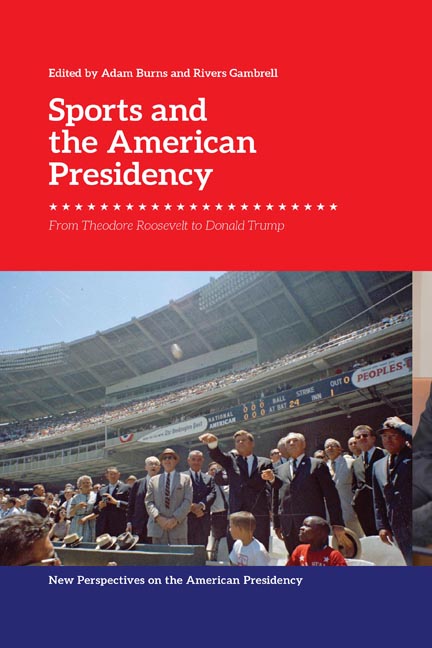1 - Theodore Roosevelt: Father of a Sporting Nation
Published online by Cambridge University Press: 20 October 2023
Summary
On February 23, 1907, President Theodore Roosevelt delivered a speech at Harvard University that once and for all summarized his opinions on what athletics should be in the United States. The address came as Roosevelt, a popular president in his second term in the White House, crested a wave of political power. The foundation for the speech had been laid over the previous decades. For years, Americans had read stories about Roosevelt playing tennis and boxing at the White House. They had seen images of him at the Army–Navy football game. They had learned that he liked to spend his Sunday afternoons taking long, muddy point to point hikes through Rock Creek Park. More recently, they knew that the president had hosted a White House football summit in 1905, a move that thwarted those reformers who wanted to abolish football and contributed to the rise of the National Collegiate Athletic Association (NCAA).
The location and audience for this speech fit the task at hand. Athletics at the turn of the twentieth century, and for Roosevelt more specifically, were about young men. Roosevelt was a graduate of Harvard University, class of 1880. His oldest son, Ted Jr., was studying at the institution in 1907. And so, with Ted Jr. and nearly 2,000 of his classmates looking on, Roosevelt wove together in this speech a tapestry that advocated for wide participation, that positioned athletics as a form of nationalism, and that made the case for the co-mingling of sports and higher education. In a way, the speech had a Gettysburg Address quality to it. It took something big and attempted to distill it down to its core. Roosevelt never had Abraham Lincoln’s penchant for brevity, nor his discipline to hammer home only one topic during one speech. But on this day in 1907, Roosevelt tried to get at the essential elements of how athletics fit into American life.
Roosevelt drove home four main points. First, the number of Americans participating in athletics needed to grow. Roosevelt believed that more Americans, particularly boys and men, needed the sharpening that athletics could provide. Second, intercollegiate athletics not only served the athletes that participated, but also served to grow sports more generally. Roosevelt believed in America’s unique blending of athletics and higher education because he saw it as a conduit to bigger changes. Third, the threat of “mollycoddle” men made sports a necessity.
- Type
- Chapter
- Information
- Sports and the American PresidencyFrom Theodore Roosevelt to Donald Trump, pp. 15 - 34Publisher: Edinburgh University PressPrint publication year: 2022



